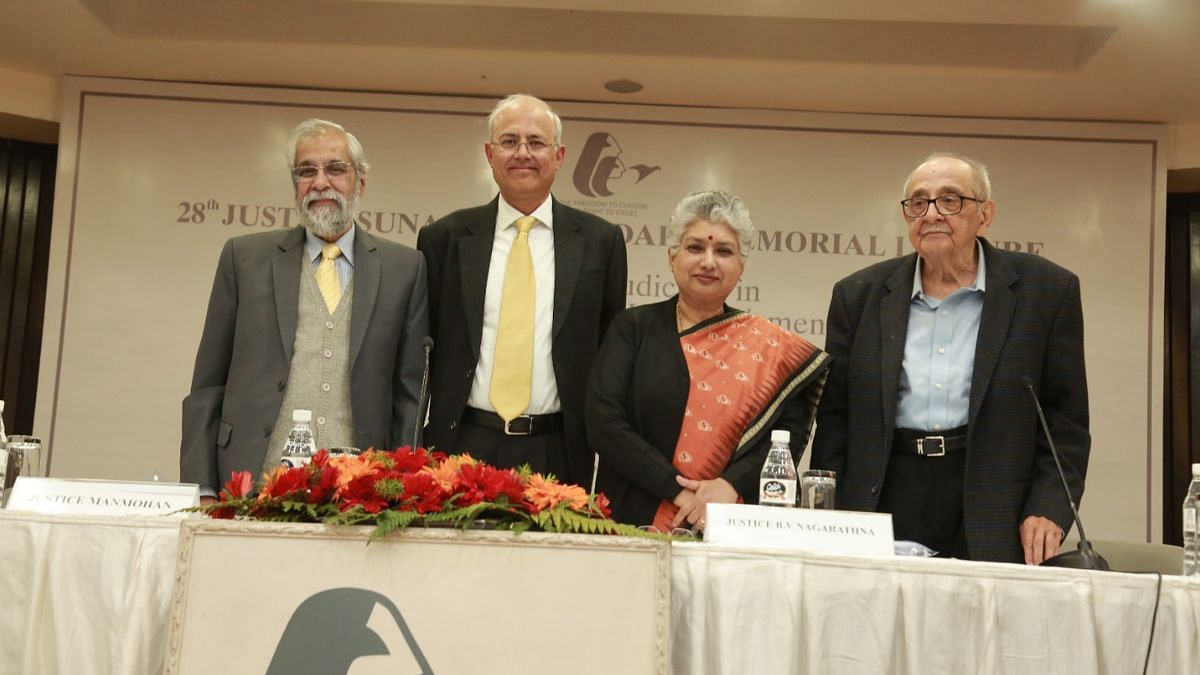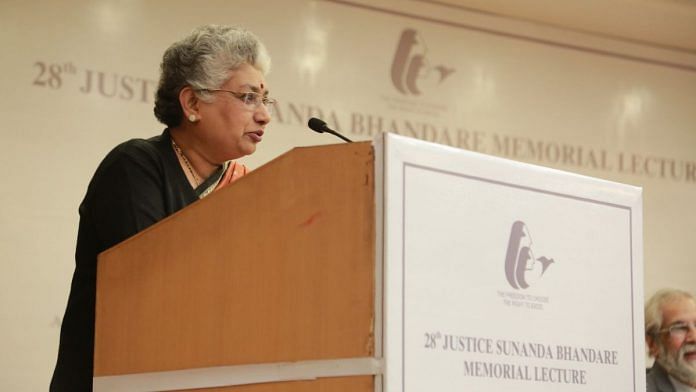New Delhi: More women judges are needed in the judiciary to improve the quality of judicial review and adjudication, said Supreme Court judge Justice B.V. Nagarathna Friday.
She stressed that enrolment of more women in the institution is a “matter of credibility and legitimacy of courts” and that it is important to improve “the language and vocabularies in judgments”. The judiciary must have more women to fulfill “the need for different experiences” and “ensure courts become more gender-neutral spaces”, she added.
The judge, who would go on to become India’s first woman Chief Justice in 2027, was delivering the 28th Justice Sunanda Bhandare memorial lecture organised by the Justice Sunanda Bhandare Foundation when she emphasised the urgent need for all organs of the state, institutions engaged in the regulation of legal profession and education “to work within their mandate to make the Indian judiciary more inclusive and diverse”.
“Having more women on the bench can contribute to a more effective space for the delivery of justice in India,” she said.
According to her, the participation of women in the judiciary is not only a constitutional imperative but also a necessary step to achieve the goal of a robust, transparent, inclusive, effective and credible judicial process.
To illustrate her point, Justice Nagarathna recalled how as a judge of the Karnataka High Court she opposed her colleague’s suggestion to deny seniority to a newly recruited woman judicial officer, who was then pregnant, because she was unable to take oath on a designated date as it clashed with her delivery date.
“Some of my bench members were of the view that since she did not take oath on the said date, she would lose her seniority. But I opposed this, which made the Chief Justice remark that he would go to the hospital to give an oath to the judicial officer. I told him (Chief Justice) that it was a good suggestion and that I would also accompany him,” the judge recalled.

The judicial officer finally took oath on the fifth day of her delivery, and the Chief Justice of the HC, concurring with Justice Nagarathna’s view, bestowed the woman with her seniority in terms of her merit in the recruitment.
Justice Nagarathna reminisced about her family’s association with Justice Bhandare, who before her elevation as a judge of the Delhi High Court, met the former’s father, who was then a sitting judge of the Supreme Court. She fondly recollected the meeting and praised the late judge for her resilience.
Justice Bhandare, who was appointed as a judge of the Delhi High Court in June 1984, died of cancer in 1994.
Justice Nagarathna said Justice Bhandare’s commitment to her work was immense as she worked even a day before she was scheduled to travel abroad for her treatment. “She delivered a judgment before she left, and thankfully, the verdict was upheld a week after she passed away,” the judge said.
Also Read: Thank you, Justice Nagarathna, for dissenting on note ban verdict, showing up RBI’s yes-men
‘Widespread perceptions persist’
Justice Nagarathna took note of several laudable judgments delivered by the Supreme Court over the years to highlight the judiciary’s contribution to women’s empowerment across the board.
These include a grant of permanent commission to women in the armed forces, the sexual harassment law, equal property rights for women and quantifying a housewife’s contribution to a domestic relationship.
She also listed the judiciary’s role in furthering the cause of gender equality by emphasising the executive’s constitutional mandate fulfilled through the promulgation of laws and the enactment of policies for the empowerment and emancipation of women.
“Equality would be reduced to a mere slogan in the absence of persistent and targeted state action for the empowerment of women. It bears repetition that despite social reform and progress, the social structure remains biased against women. Such bias is pernicious that it afflicts women from womb to tomb,” she said.
Justice Nagarathna also touched upon the institution of marriage, which she said has been nurtured by the “toiling labour and incommensurable care work of women — as mothers, wives, sisters, daughters, aunts, and so forth”.
“Widespread perceptions persist that an ideal marriage match is one between an ‘educated and well-trained’ man and a woman with the kind of education and background in domestic skills that would make her a good homemaker,” she said.
However, according to her, both women and men must realise they are the pillars of the institution of marriage.
“Different pillars serve different but equally important purposes. No family can subsist without a healthy balance of economic or care work. A condescending attitude towards women in the family is the cause of the cracks and, domestic violence and infidelity are the outcome of the emerging cracks,” the judge added.
(Edited by Richa Mishra)
Also Read: Can women judges do naagin dance at house party? No, only male judges can flex on Instagram



